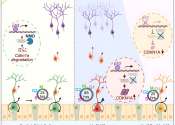Happy or angry: Researchers discover brain network that recognizes emotions
The Genetics of Cognition research group coordinated by Francesco Papaleo at the Italian Institute of Technology (IIT) has discovered a brain network present in animals and humans that allows them to recognize others' emotions. ...
5 hours ago
0
17









